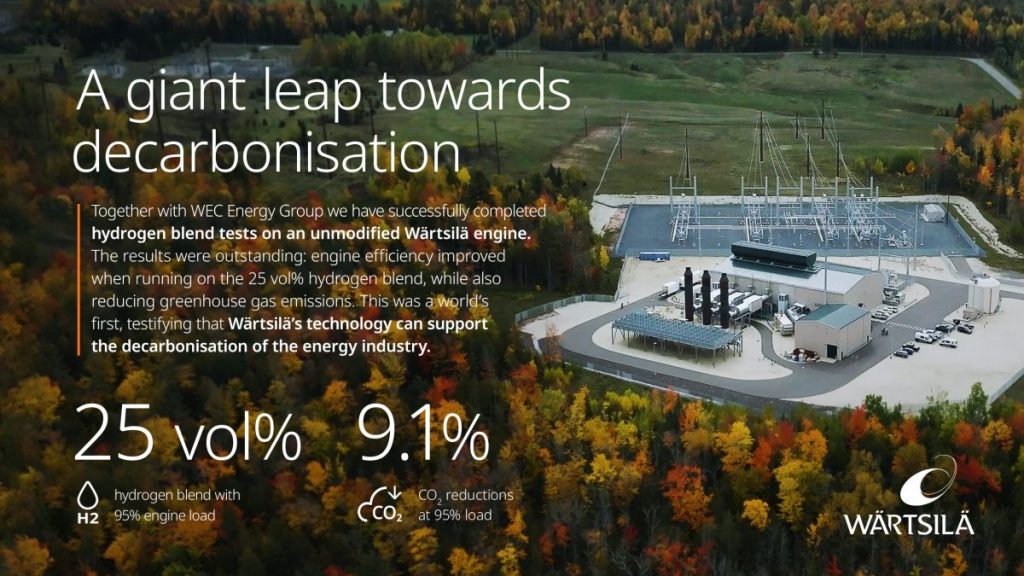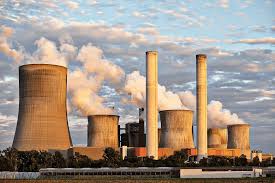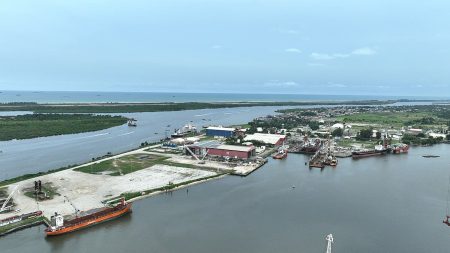
Lagos — The ability of engine power plants to run on green hydrogen fuel rather than gas or heavy fuel oil will be a key enabler of Africa’s renewable energy ambitions.
The technology group Wärtsilä and WEC Energy Group have successfully tested the capabilities of a Wärtsilä engine running on 25 vol% hydrogen-blended fuel. The tests, which were completed in October 2022, were conducted at WEC Energy Group’s 55 MW A.J. Mihm power plant in Michigan, USA using an unmodified Wärtsilä 50SG engine. Throughout the testing period, the Wärtsilä engine continued to supply power to the grid. This is the largest commercially operated flexible balancing engine ever to run on a hydrogen fuel blend, representing therefore a world-first achievement.
EPRI also participated in the tests and led the assessment of the engine’s performance during the testing. In a recently released report, EPRI’s analysis confirmed the feasibility of blending hydrogen (H2) with natural gas for use in an existing Wärtsilä engine. The demonstration results also showed hydrogen can be safely and reliably handled and utilised in engine technology.
During three days of continuous testing, the capability of the engine to co-fire hydrogen blends was successfully demonstrated, showing clear improvements in engine efficiency and reduced greenhouse gas emissions, while staying compliant with NOx emissions. A 95% engine load was achieved with the 25 vol% H2 blend. This verifies the fuel flexibility of Wärtsilä engines without compromising efficiency. Further testing showed that with a 17 vol% H2 blend, a 100% engine load was attainable.
The EPRI report states that this class of engines can therefore maintain its higher efficiency compared to simple-cycle gas turbines. Because engines in general have higher efficiency, their relative CO2 output compared to turbines will also be lower, as was the case in this study.
“These tests provide clear evidence that Wärtsilä’s engine technology can deliver future-proof power solutions that make a huge contribution towards decarbonised operations. The results of the testing with a hydrogen/natural gas blended fuel mix have been outstanding. We continue developing and futureproofing our engines to run on sustainable fuels and expect to have an engine and power plant concept for operating with pure hydrogen available by 2026,” said Anja Frada, Chief Operating Officer, Wärtsilä Energy.
“EPRI is accelerating deployment of a full portfolio of clean energy technologies to support a net-zero future,” said EPRI Vice President of Energy Supply and Low-Carbon Resources Neva Espinoza. “This demonstration project with Wärtsilä and WEC Energy Group is significant in showing the potential of hydrogen blending in natural gas-fired engines. The learnings from this project will be shared with the energy industry to further progress toward deep decarbonization targets.”
As utilities increase the utilisation of renewable energy assets, such as wind and solar, opportunities exist to produce hydrogen for long-term energy storage from excess renewable energy. As a fuel, hydrogen burns without producing any carbon species including CO2. Hydrogen electrolyser manufacturing capacity sits at nearly 8 GW/yr today, but it could exceed 60GW/yr by 2030 based on industry announcements.
“We’re very pleased to take a leading role exploring the potential of this technology as we focus on providing customers with affordable, reliable and clean energy,” said Gale Klappa, executive chairman — WEC Energy Group. “As we bring more renewable energy online, we must ensure that we can keep the lights on when the sun is not shining and the wind is not blowing. The results of this project are a strong indicator that these dispatchable units can run on very low- and no-carbon fuels.”
Amongst other sustainable fuels, hydrogen will be critical to reaching net zero emissions, and is expected to contribute 20% of the total abatement of CO2 needed in 2050.[1] However, today’s global energy industry is not built for the adoption of pure hydrogen as a secure power source. Significant investment into market-ready engines which can run on sustainable fuels is therefore crucial in supporting the transition to net-zero. Wärtsilä is pioneering the adoption of hydrogen as a viable fuel through advanced development and testing of fuel flexible engines.



